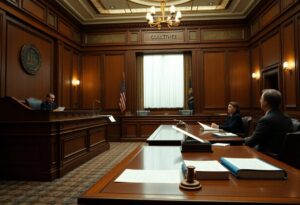Can You Trust Your MA DCF Social Worker During a Child Abuse Investigation?
Trust in MA DCF social workers is often assumed but for many families like the Whites, that trust is tested the moment a 51A report is filed. When a Department of Children and Families (DCF) social worker knocked on their door, it wasn’t just a visit; it was the start of a nightmare. Accused of neglect without evidence, the Whites felt powerless, facing an investigation that turned their lives upside down. The stress of navigating false allegations and unclear processes left them feeling alone and under constant scrutiny.
For families involved in domestic violence cases, the situation can be even worse. A single misstep or misunderstanding can lead to DCF questioning their ability to care for their children. This guide sheds light on whether you can trust your DCF social worker during such investigations, offering practical advice and support.
Continue reading to learn how to protect your family and ensure your rights are respected during a DCF investigation.
Understanding the Role and Trust in MA DCF Social Workers During Child Abuse Investigations
Massachusetts DCF social workers aim to keep children safe by assessing their home environment and family situation. They conduct interviews, visit homes, and consult with professionals to determine if abuse or neglect has occurred. However, not all social workers fully understand complex family dynamics, especially in domestic violence cases.
What are the Responsibilities of DCF Social Workers?
DCF social workers play a crucial role in ensuring child welfare during investigations. Here are their responsibilities:
- Home Visits: Social workers inspect the living conditions to ensure they are safe for the child.
- Family Interviews: They talk to parents, children, and other household members to gather information.
- Professional Consultations: Social workers may consult with doctors, teachers, and other professionals involved with the family to get a comprehensive view of the child’s well-being.
- Documentation: Keeping detailed records of their findings and interactions with the family.
How Does the DCF Investigation Process Work?
DCF investigations start with a report of suspected abuse or neglect, followed by screenings and detailed investigations.
What Happens During a 51A Report Screening?
A 51A report triggers the start of a DCF investigation. The screening process involves:
- Initial Report: This report can be made by mandated reporters or concerned individuals who suspect that a child is abused or neglected.
- Evaluation: DCF screens the report to determine if it meets the criteria for further investigation. This involves checking the details of the report and gathering initial information from involved parties.
- Decision: Based on the screening, DCF decides whether to “screen in” the report for further investigation or “screen out” if it doesn’t meet the criteria.
During the screening, social workers gather initial information, which includes speaking to the reporter and possibly the family. This stage is crucial as it sets the direction for the investigation.
What Are the Steps in a 51B Investigation?
If the case is screened in, a 51B investigation begins, involving several detailed steps:
- Family Interviews: Social workers thoroughly interview parents, children, and other family members.
- Home Visits: They inspect the home to observe the living conditions firsthand.
- Consultations: Social workers consult with professionals like doctors, teachers, and therapists who interact with the family.
- Review of Past Records: Any previous DCF involvement or reports are reviewed to understand the family’s history.
- Determination: The investigation concludes with a determination of whether the allegations are “supported,” “unsupported,” or result in a “substantiated” concern.
The White family’s case showed how these steps could be mishandled, stressing the need for thorough investigations.
Evaluating Trust in MA DCF Social Workers and the Information They Provide
The quality of information from DCF social workers can vary widely. Some social workers are thorough and committed to understanding the full context of a family’s situation, while others may rush through their duties, leading to incomplete or inaccurate conclusions. It’s crucial to recognize that DCF workers can sometimes have biases or may not fully grasp the complexities of domestic violence cases.
In Massachusetts, many families have reported that DCF investigations did not fully consider their circumstances, leading to distress and mistrust. Always cross-check the findings with your lawyer to ensure accuracy and fairness in the investigation.
Should You Rely on Your MA DCF Social Worker for Legal Advice?
Do not rely on DCF social workers for legal advice. They are not lawyers and may not fully understand the legal intricacies of your rights. Their primary role is to assess the safety and well-being of children, not to guide you through legal procedures.
Understanding your constitutional rights is essential during a DCF investigation. Consult with an attorney who can provide legal counsel and ensure your rights are protected. Legal advice from a qualified lawyer is crucial to navigating the complexities of the investigation process and responding appropriately to any actions taken by DCF.
How Can You Protect Your Rights During a DCF Investigation?
Protect your rights by reading the DCF Parent Pamphlet and knowing your legal rights. Be proactive and well-informed to prevent social workers from overreaching.
What Should You Do if False Allegations Are Made?
If you face false allegations, staying calm and documenting everything meticulously is critical. Here are the steps to take:
- Document Interactions: Keep detailed records of all communications with DCF, including dates, times, and the nature of each interaction.
- Seek Legal Help: Immediately contact an attorney experienced in DCF cases to guide you through the process and advocate on your behalf.
- Cooperate but Protect: While cooperation is essential, do not disclose more information than necessary. Stick to the facts and avoid emotional responses.
How Can You Effectively Communicate with DCF Social Workers?
Effective communication with DCF social workers is crucial to avoid misunderstandings and protect your family’s interests. Here are some tips:
- Be Clear and Concise: Provide accurate information without unnecessary details.
- Stay Respectful: Maintain a calm and respectful demeanor, even if you feel stressed or unfairly treated.
- Seek Clarification: If you don’t understand something, ask the social worker to explain it clearly. By ensuring everyone is on the same page, misunderstandings can often be avoided.
What Legal Support is Available for Families During DCF Investigations?
A lawyer knowledgeable and experienced in family law and DCF cases is essential during a DCF investigation. Lawyers protect your rights, provide legal advice, and help you navigate the process.
Why is Legal Support Crucial?
Families often feel overwhelmed during a DCF investigation. Lawyers ensure that families understand and exercise their legal rights, clarifying complex issues and helping them make informed decisions.
What Specific Actions Can Lawyers Take to Protect Family Rights?
During DCF investigations, lawyers play a key role in protecting family rights. Here are specific ways they can help ensure fair treatment and accurate representation.
1.Representation: Lawyers represent families in all interactions with DCF, ensuring their rights are upheld.
2.Documentation Review: They review documents and reports for accuracy, challenging discrepancies.
3.Legal Advice: Lawyers advise on the best course of action, explaining the implications of decisions.
4.Appeals: They help file appeals if the findings are unjust.
Key Takeaway
Ultimately, trust in MA DCF social workers should be balanced with an understanding of your rights and legal protections. Knowing your legal rights and having strong legal support can significantly impact the outcome of a DCF investigation. Stay informed, document interactions, and consult with an experienced attorney to protect your family’s rights.
Families must remain vigilant and proactive during DCF investigations. Legal support helps navigate the process and guard against potential biases. Families can ensure a fair resolution by making informed decisions and seeking legal advice.
You find yourself in this situation, it’s advisable to seek legal representation from a qualified attorney, like those at the Law Office of Kevin Seaver, who can advocate for your rights and guide you through the complex process of a DCF investigation.
Remember that the ultimate goal of DCF is to ensure the safety and well-being of children while supporting families in crisis.
Please note that this article does not create an Attorney-Client relationship between our law firm and the reader and is provided for informational purposes only. Information in this article does not apply to all readers.
Readers should not rely on this information as legal advice and should seek specific counsel from the attorney based on personal circumstances. Thank you.
Kevin Patrick Seaver is a Massachusetts DCF Defense Lawyer who represents parents against false child abuse allegations.
Massachusetts DCF Defense Lawyer Kevin Seaver has been successfully fighting false child abuse allegations since 1991.






